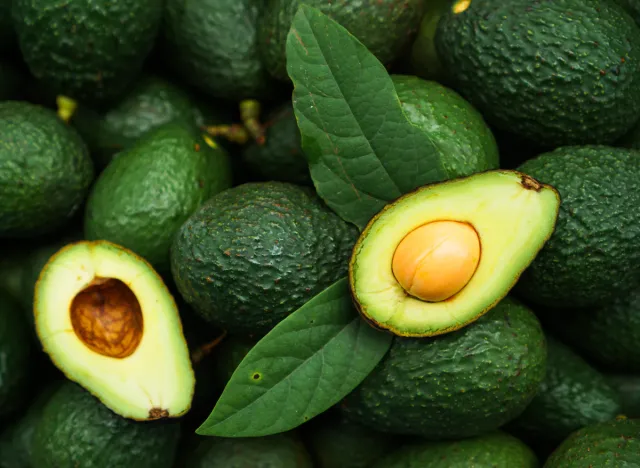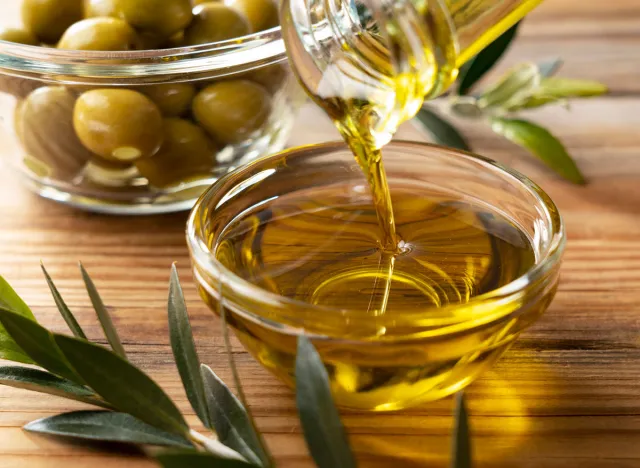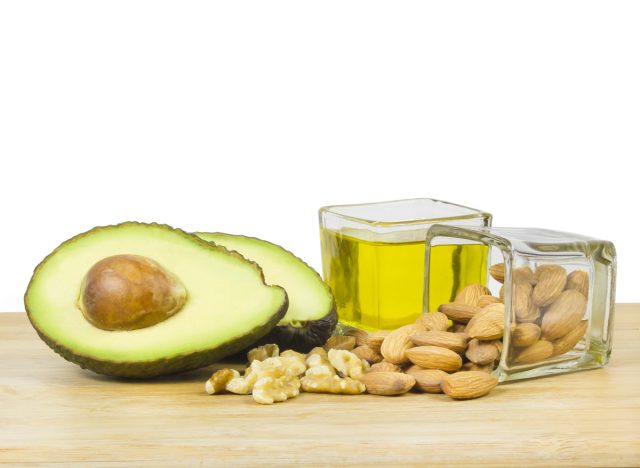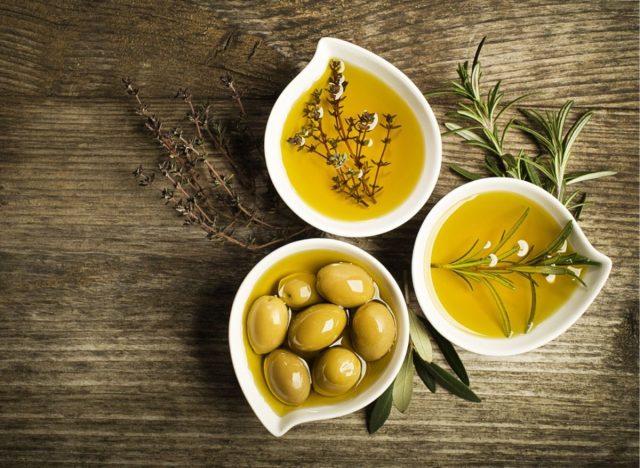Is Avocado Oil Healthier Than Olive Oil? Here's What Science Says

When it comes to choosing a healthy oil for your kitchen, avocado oil and olive oil are often at the top of the list. Both are rich in heart-healthy fats and offer a range of health benefits, making them popular choices for the health-conscious.
However, while both oils have a variety of culinary uses, there are some key differences. Whether you're drizzling them over salad or using them for high-heat cooking like stir-fries, understanding the differences between these two popular oils can help you make more informed choices.
So, when it comes to avocado oil vs. olive oil, is one healthier? Read on to learn about the origins, nutritional profiles, health benefits, and culinary uses of avocado oil and olive oil to help you decide which one best suits your needs.
Origins and Production
While the origins of each oil are different, their production process is similar, especially for virgin (unrefined) oils.
Avocado Oil Production
Avocado oil comes from the flesh of ripe avocados. The fruit is pressed to remove the oil; once a paste of the flesh has been made, it is slowly mixed to help release the oil. This process typically takes 40 to 60 minutes at around 110 to 120 degrees F. While this is done at a higher temperature than olive oil extraction, it is still considered cold-pressing.
Once the oil has been removed from the fruit, it can either be refined or left in its natural state. Unrefined or extra virgin avocado oil has a deep green color and a robust, buttery flavor. Oil extracted from low-quality fruits is often further processed to remove unwanted colors and odors. Refined avocado oil has a pale yellow color and a milder flavor profile.
Olive Oil Production
In contrast, olive oil comes from the flesh of olives. Like avocado oil, the fruit is pressed to remove the oil. Olive oil can be refined or unrefined. Extra virgin olive oil is the least processed type of olive oil and retains a strong, peppery flavor. It's also packed with beneficial compounds like polyphenols.
Refined olive oils have a lighter taste and color. They also have a higher smoke point, making them better for high-heat cooking. Olive oil must be packaged in dark containers to prevent degradation by light.
Nutritional Comparison
When it comes to the nutritional composition of avocado oil and olive oil, they share many similarities.
Avocado Oil

Calories: 124
Total Fat: 14 g
Saturated Fat: 1.6 g
Unsaturated Fat: 11.8 g (Monounsaturated Fat: 9.9 g, Polyunsaturated Fat: 1.9 g)
Vitamin E: 2.9 mg
Avocado oil is rich in monounsaturated fats, especially oleic acid. It is also rich in vitamin E, containing an additional one gram per tablespoon compared to olive oil. Although it contains slightly more calories and fat than olive oil, it is also slightly lower in saturated fat.
Olive Oil

Calories: 119
Total Fat: 13.5 g
Saturated Fat: 1.9 g
Unsaturated Fat: 11.3 g (Monounsaturated Fat: 9.9 g, Polyunsaturated Fat: 1.4 g)
Vitamin E: 1.9 mg
Olive oil is rich in monounsaturated fats and, like avocado oil, contains about 70% to 80% oleic acid. It is also an excellent source of antioxidants, such as polyphenols and vitamin E.
Health Benefits
Avocado oil and olive oil share similar health benefits due to their high content of monounsaturated fats, antioxidants, and vitamin E.
A study of over 93,000 people found that those who ate monounsaturated fats from plant foods like olive oil and avocados had lower rates of death from cancer and heart disease.
Avocado Oil Benefits

The monounsaturated fats like oleic acid found in avocado oil are linked to several heart-health benefits, such as reducing LDL (bad) cholesterol levels.
In a small study involving 13 people, participants ate a high-fat, high-calorie meal with either butter or avocado oil. After the meal, several blood markers were measured. They found that the people who ate the meal with avocado oil had significantly lower levels of triglycerides (fat found in the blood), total and LDL cholesterol, inflammatory molecules, and blood sugar compared to those who ate the meal containing butter.
With its higher vitamin E content, avocado oil may also benefit skin health. An older study involving 13 people with chronic plaque psoriasis found that a cream containing avocado oil and vitamin B12 was effective for the long-term treatment of psoriasis. However, it's unclear whether the benefits were due to the avocado oil alone or to the combination of avocado oil and vitamin B12. Also, more research is needed to determine whether eating avocado oil has the same skin benefits as using it topically.
Olive Oil Benefits

A staple in the Mediterranean diet, olive oil is packed with anti-inflammatory polyphenols, which can reduce the risk of certain chronic diseases like heart disease and cancer. They may also protect against neurodegenerative disease and osteoporosis.
A systematic review and meta-analysis looking at the effect of olive oil consumption on chronic disease found the following:
- A 16% reduced risk of heart disease for every 25 grams of olive oil eaten daily.
- A 22% lower relative risk of type 2 diabetes for every 25 grams of olive oil eaten daily.
- An inverse association between olive oil consumption and death from any cause (in other words, eating olive oil was associated with a lower risk of death).
Research also suggests that olive oil consumption may help enhance brain function and protect against cognitive decline.
Are There Any Risks?
Overall, avocado oil and olive oil are considered safe oils to consume. However, there are some safety tips to keep in mind.
Avocado Oil Health Considerations
While avocado oil is generally considered safe, those with avocado allergies should avoid it.
Additionally, a 2020 study found that many store-bought avocado oils had issues with quality and purity. Many of the oils tested were found to have oxidized (meaning they had begun to spoil), likely due to poor storage, using damaged avocados, or harsh processing methods.
However, extra-virgin oils (which are typically more expensive) should meet higher quality standards compared to refined oils, so choosing extra-virgin avocado oil is a good way to ensure you're getting a quality product.
Olive Oil Health Considerations
Like avocado oil, olive oil is also largely considered safe. However, it can degrade (especially extra-virgin olive oil) if exposed to high temperatures or light for extended periods. To ensure you're getting a high-quality olive oil, choose an oil that comes in a dark glass container, which can help protect against degradation by light. Store olive oil in a cool, dark place to ensure it doesn't spoil prematurely.
Some olive oils on the market may be adulterated with cheaper oils like sunflower or soybean oil. To ensure your olive oil is pure, look for the Protected Designation of Origin (PDO) or Protected Geographical Identification (PGI) seals, which indicate that the oils have been prepared according to high quality standards.
Taste & Cooking Properties

One key difference between avocado oil and olive oil is their smoke point. The smoke point is the temperature at which the oil starts to degrade, producing by-products that may alter the oil's flavor and can also negatively impact health.
Cooking with Avocado Oil
Avocado oil has a robust, buttery flavor, making it ideal for salad dressings or as a finishing oil. Its high smoke point (over 480 F) makes it an excellent option for grilling and roasting.
Cooking with Olive Oil
Extra virgin olive oil has a fruity, peppery flavor that can enhance cold dishes like salads and dips. Its lower smoke point (around 400 F) makes it less suitable for high-heat cooking but a good choice for lower-heat cooking methods like sautéing.
Is One Oil Healthier Than the Other?
So, when it comes to the question of avocado oil vs. olive oil, remember that both offer heart-healthy fats and a range of other health benefits. Avocado oil is slightly higher in calories and vitamin E. It also has a higher smoke point, making it better for high-heat cooking. Its robust, buttery flavor also works well in dressings and as a finishing oil.
On the other hand, olive oil, particularly extra-virgin olive oil, is packed with anti-inflammatory polyphenols and is a staple of the Mediterranean diet. It's linked to a reduced risk of heart disease, type 2 diabetes, and cognitive decline. It's best used in cold dishes or for low- to medium-heat cooking, as it has a lower smoke point than avocado oil.
For quality and health benefits, both oils are a great choice. However, avocado oil is a better choice for high-heat cooking, while olive oil is ideal for adding flavor and health benefits to cold dishes and lower-heat cooking.
Why Trust Eat This, Not That!?
Eat This, Not That! is committed to creating high-quality content that you can trust to be accurate, properly researched, routinely reviewed, and updated with the latest information. Our writers, editors, and medical and/or certified experts consider this to be an unwavering promise we make to our readers in the pursuit of delivering impactful and meaningful content.
- Source: https://www.researchgate.net/profile/Allan-Woolf/publication/294404973_What_is_unrefined_extra_virgin_cold-pressed_avocado_oil/links/5f40e593a6fdcccc43e5b9ad/What-is-unrefined-extra-virgin-cold-pressed-avocado-oil.pdf
- Source: https://www.mdpi.com/2071-1050/14/2/654
- Source: https://www.mdpi.com/2304-8158/9/8/1014
- Source: https://fdc.nal.usda.gov/fdc-app.html#/food-details/173573/nutrients
- Source: https://www.scielo.br/j/cr/a/VqMdKHmY4y5zHgtJKjc98nS/?lang=en
- Source: https://fdc.nal.usda.gov/fdc-app.html#/food-details/2194712/nutrients
- Source: https://fdc.nal.usda.gov/fdc-app.html#/food-details/171413/nutrients
- Source: https://pubmed.ncbi.nlm.nih.gov/30689516/
- Source: https://www.sciencedirect.com/science/article/abs/pii/S1756464617305315?via%3Dihub
- Source: https://pubmed.ncbi.nlm.nih.gov/11586013/
- Source: https://pubmed.ncbi.nlm.nih.gov/29437027/
- Source: https://pubmed.ncbi.nlm.nih.gov/36343558/
- Source: https://www.ncbi.nlm.nih.gov/pmc/articles/PMC10598670/
- Source: https://www.sciencedirect.com/science/article/pii/S0956713520302449
- Source: https://www.ncbi.nlm.nih.gov/pmc/articles/PMC10745825/
- Source: https://www.melhorsaude.org/wp-content/uploads/2020/05/ASNH-02-0083.pdf









